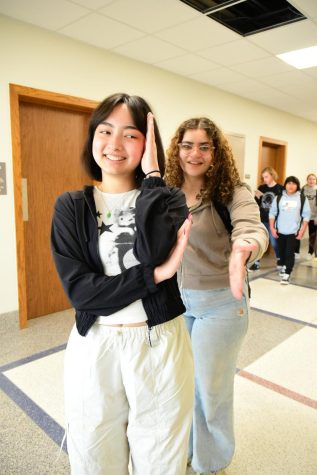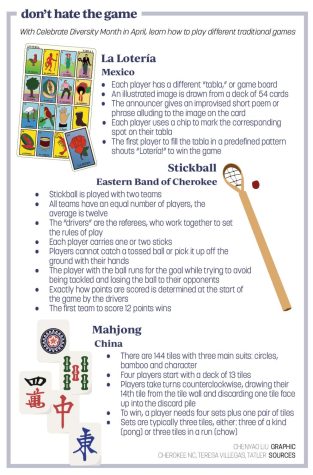When senior Arthur Yeh was younger, he often visited his family in Taiwan.
“(My family) has a really nice temple, which my grandmother runs,” he said. “Whenever we went to Taiwan, we just stay in the temple where it’s hot, humid and sweaty…That kind of makes up the cornerstone of my memory.”
Though his family managed the temple, Yeh said he remembers feeling bored.
“I had nothing to do. I was just at the temple all day,” he said. “So, my uncle taught me bànqí.”
connecting with family
Bànqí, which translates to “Half Chess,” is a Chinese board game that utilizes half of the Chinese chess board. According to DBpedia, bànqí is a social game, usually played for fun and not serious competition. Yeh said playing bànqí was a way for him to get closer to his family.
“I played (bànqí) so much in my free time, just randomly,” he said. “I played it so much that my uncle actually gave me a really huge board, like this big. It’s huge; I still have it. The pieces were huge, they were made out of porcelain or nice plastic and it was carved. I still have that copy and I have a really, really old (board) of parchment and paper and wood. That’s how I got accustomed to the game. It’s a family gift.”
Freshman Allison Shen said she agreed playing traditional games helped her relationships with family members. Shen, who identifies as Chinese-American, said playing Chinese games like “mahjong” with her grandparents helped her get closer to them.
“Ever since I was really little, I would play (mahjong) with my parents and my grandparents during game nights,” Shen said. “I feel like playing games, especially mahjong, was a great way for (me and my grandparents) to get connected. I also learned Chinese chess and Gomoku. I think my grandparents also taught me that.”

Junior Nada Dawood, who identifies as Egyptian-American, said she believes cultural games are an important way of communicating with her relatives.
“(The game) gives you a connection and a form of communication when you do go back (to your relatives),” Dawood said. “It’s just fun to have it. So when you go back or you’re sitting in your room with the aunts and the uncles and they’re discussing, it’ll come up in conversations with my family. (They would say), ‘Remember when we used to play?’ and you’re like, ‘Let’s play.’ So, I think that’s somewhat important. It gets past the language barrier.”
connecting with culture
Junior Miguel Ortiz-Perez, who identifies as Mexican-American, said he has a different perspective on traditional games. Though he said he agreed traditional games create a connection between a family, he also said playing a traditional Mexican card game called “lotería” helped him learn more about his culture.
“During Hispanic Heritage Month, I put more time into trying to learn more about my culture, and I played lotería with my family. While I played it, I realized how important my culture is and how it affects me,” Ortiz-Perez said. “I was able to learn more about my culture and the history about certain things because in the game lotería, there are cards that represent certain things from (Mexican) history. It just brings me closer to my family because I can understand where I came from.”
Lotería, bànqí, mahjong—all are types of traditional games, which UNESCO defines as “deriving from regional or local identity” and “part of the universal heritage diversity.”
Ryan Comfort, professor at IU’s Media School and citizen of the Keweenaw Bay Band of Lake Superior Ojibwe, said traditional games are a form of culture. He said he believes immigrants and Indigenous peoples often experience a loss of culture.
“One of the things that Indigenous people and perhaps immigrant families have in common is this: trying to find strategies to revitalize and retain culture in the face of forces that may cause us to lose those things,” he said. “For immigrants, that’s becoming removed from the culture that surrounds you and sustains your connection. For Indigenous people, that actually did happen, too, if you think about the boarding schools, federal policies like relocation, did very similar things. The idea behind those was to disconnect Indigenous peoples from their culture.”

Comfort said traditional games can help to combat this disconnect. He referenced “stickball,” an Indigenous sport with a connection to Cherokee, Chickasaw, Choctaw and other North American tribes. Comfort said traditional games like stickball carry the values of the culture they exist in.
“The last several decades, (Indigenous peoples) have been making really concerted efforts to revitalize our culture. Stickball has been a really big component of that for…Cherokee citizens,” he said. “The idea (of stickball) was to teach, prepare young men for combat through this game. But also embedded within the game were these ideas of language, of community, of respect, of ceremony. It’s this game that’s tied to a lot of components of Cherokee culture.”
Ortiz-Perez said he agreed many cultural values existed in traditional games. Specifically, he said he was able to use Spanish more when playing lotería.
“Since being in America, I don’t use Spanish as much because of the education system,” he said. “There (aren’t) that many opportunities to use Spanish and just talk about my culture, overall. Whenever I play games with (my family), I’m able to obviously talk in Spanish and I’m able to discuss questions or anything about my culture that I don’t know about since I am first-generation, born in America.”
Dawood said she agreed.
“(Through) salah, the hand-slapping game (my mom taught me), I learned curse words,” she said, laughing. “If you know how to curse in your language, you’re peak ethnic.”
teaching the future
Beyond allowing immigrants and Indigenous peoples to connect with their heritage, Shen said she believes traditional games are a helpful way to teach about culture.
“I feel like (traditional games) are honestly a great way to learn (other) cultures, and their ways of playing games,” she said. “For example, Chinese chess is slightly different from normal, Western chess. I feel that some of the aspects are actually related to China’s history, because a lot of the players are soldier names. I feel like it’s a great way to learn more about the culture while having fun at the same time.”
Comfort said he agreed. According to him, it is important for people to educate themselves on other cultures, and games are a good way to facilitate that learning.
“Games are a fun way to learn about another culture,” he said. “As high school students get ready to become adults and think of all the job markets and the global world they enter in, you’re going to be entering into a much more globalized world. It’s really important to gain a curiosity for other cultures, to gain an appreciation for other cultures, and to understand and value learning about the cultures they may enter and encounter as they move forward in their lives.”































![What happened to theater etiquette? [opinion]](https://hilite.org/wp-content/uploads/2025/04/Entertainment-Perspective-Cover-1200x471.jpg)













































![Review: “The Immortal Soul Salvage Yard:” A criminally underrated poetry collection [MUSE]](https://hilite.org/wp-content/uploads/2025/03/71cju6TvqmL._AC_UF10001000_QL80_.jpg)
![Review: "Dog Man" is Unapologetically Chaotic [MUSE]](https://hilite.org/wp-content/uploads/2025/03/dogman-1200x700.jpg)
![Review: "Ne Zha 2": The WeChat family reunion I didn’t know I needed [MUSE]](https://hilite.org/wp-content/uploads/2025/03/unnamed-4.png)
![Review in Print: Maripaz Villar brings a delightfully unique style to the world of WEBTOON [MUSE]](https://hilite.org/wp-content/uploads/2023/12/maripazcover-1200x960.jpg)
![Review: “The Sword of Kaigen” is a masterpiece [MUSE]](https://hilite.org/wp-content/uploads/2023/11/Screenshot-2023-11-26-201051.png)
![Review: Gateron Oil Kings, great linear switches, okay price [MUSE]](https://hilite.org/wp-content/uploads/2023/11/Screenshot-2023-11-26-200553.png)
![Review: “A Haunting in Venice” is a significant improvement from other Agatha Christie adaptations [MUSE]](https://hilite.org/wp-content/uploads/2023/11/e7ee2938a6d422669771bce6d8088521.jpg)
![Review: A Thanksgiving story from elementary school, still just as interesting [MUSE]](https://hilite.org/wp-content/uploads/2023/11/Screenshot-2023-11-26-195514-987x1200.png)
![Review: "When I Fly Towards You", cute, uplifting youth drama [MUSE]](https://hilite.org/wp-content/uploads/2023/09/When-I-Fly-Towards-You-Chinese-drama.png)
![Postcards from Muse: Hawaii Travel Diary [MUSE]](https://hilite.org/wp-content/uploads/2023/09/My-project-1-1200x1200.jpg)
![Review: "Ladybug & Cat Noir: The Movie," departure from original show [MUSE]](https://hilite.org/wp-content/uploads/2023/09/Ladybug__Cat_Noir_-_The_Movie_poster.jpg)
![Review in Print: "Hidden Love" is the cute, uplifting drama everyone needs [MUSE]](https://hilite.org/wp-content/uploads/2023/09/hiddenlovecover-e1693597208225-1030x1200.png)
![Review in Print: "Heartstopper" is the heartwarming queer romance we all need [MUSE]](https://hilite.org/wp-content/uploads/2023/08/museheartstoppercover-1200x654.png)


